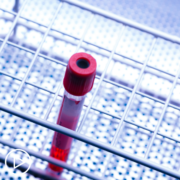The Link Between Prostate Cancer and Inherited Mutations
The Link Between Prostate Cancer and Inherited Mutations from Patient Empowerment Network on Vimeo.
How can inherited genetic mutations affect the course of your disease? Dr. Sumit Subudhi explains the link between inherited mutations and prostate cancer and how these mutations affect disease progression in patients with prostate cancer.
Dr. Sumit Subudhi is a Medical Oncologist at The University of Texas MD Anderson Cancer Center.
See More From INSIST! Prostate Cancer
Related Resources

Prostate Cancer Testing: What Tests Should You Advocate For? |

How Can You Access Personalized Prostate Cancer Treatment? Resource Guide |

|
Transcript:
Katherine:
Dr. Subudhi, what is the link between inherited mutations and prostate cancer?
Dr. Subudhi:
Yeah, so in approximately 10% to 15% of patients with prostate cancer, they have an inheritable cause for their cancer. And so, this predisposes them to not just having prostate cancer, but potentially to other cancers, but also their family members.
In regards to the inheritable causes, the BRCA mutations – BRCA2 and BRCA1 – are very common. In fact, BRCA2 is more common than prostate cancer than BRCA1. In addition, there’s CHEK2 and ATM which are common inheritable mutations. And the other ones are the mismatch repair genes. Again, all these play an important role in repairing DNA. So, if you’re mutated in these genes, then your ability to repair DNA has been significantly diminished, and you’re more likely to gain more mutations.
Katherine:
How do these mutations affect disease progression?
Dr. Subudhi:
Yeah. So, what they can do is they can lead to mutations that make the cancer grow more. And there’s two ways to do it. You can have a mutation in what we call an oncogene, a gene that when it’s active, it’s going to just promote the cancer.
And then we have other genes called tumor suppressor genes. Their normal function is to prevent the cancer from growing. But if the tumor suppressor gene gets mutated so it’s no longer functional, then the cancer can then take off, because it’s no longer suppressed. So, those are how these genes can actually affect the prostate cancer.
If you have either an inheritable mutation in these genes or a somatic mutation, then there’s a chance that the PARP inhibitors could actually work for you. And the PARP inhibitors, they actually target cancers where there’s a defect in the DNA repair pathway.
Now, there’s one thing that I want to point out that a lot of people sort of are missing, and it’s not a subtle point. Not all inheritable mutations are made the same – or even somatic mutations. Meaning, what we’re learning is the PARP inhibitors seem to be more active with the “Braca,” or BRCA, mutations and the ATM mutations. Whereas, they’re less active with other types of DNA repair mutations. So, the point is not all mutations are made the same.










